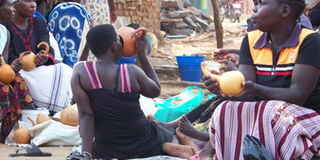Prime
Alcohol abuse: West Nile’s silent killer

Women enjoy a local potent gin, malwa, in Nebbi Town recently. PHOTO BY FELIX WAROM OKELLO.
What you need to know:
Family heads, local leaders and school going children spend the bigger part of the day drinking, a practice that is seriously hampering the development of the region.
WEST NILE
Alcohol consumption is embedded in most traditions that seem to have been transmitted over generations. Each year, alcohol consumption in Uganda is on the rise. Intake of colossal amounts of potent gins and other forms of crude liquor in mostly poverty-stricken rural communities and urban slums has raised health alarm.
For the West Nile sub-region, the allure of alcohol is something to ponder for anyone interested in the dynamics of Ugandan cultures.
From Adjumani, Arua, Koboko, Maracha-Terego, Moyo, Nebbi and Yumbe districts, men, women and children hold alcohol in special regard. Farmers, civil servants, school children and even expectant mothers would rather pool under a mango tree and drink the day away than engage in activities that raise the standards of living in their communities.
Going for the cheap drink
And we are not talking about bottled beer, we are talking about the relatively inexpensive, home-distilled waragi or enguli that have alcohol fractions upwards of 40 per cent.
Others will keep on sucking the sachets of waragi, kwete, enguli, malwa, Kasese and even keep on changing the joints. On the face of it, it is rather difficult to explain the strong love for liquor in this part of the country.
In Madi sub-region, there are two beliefs about the power of alcohol. First, when a baby is born, the first thing the parents put in its mouth is a local brew. And when the baby reacts, the parent will know that he or she is healthy. Others say it is to let the baby know from day one that it is one of the most popular drinks consumed in the area. However, the reasons for drinking in this part of the region are no different from any other part of the world.
Inadequate parental supervision, unemployment, poverty and the availability of cheap alcohol are some of the reasons given by the residents here.
For John Adubango, a 23-year-old S4 dropout, the only thing that can keep him busy is drinking.
“I have failed to find a job and have been staying at home idle for about three years now. I learnt drinking through a friend who offered me a sachet of waragi. I now wake up at 5:30am and head to the bar,” Mr Adubango, a resident of Adjumani Town Council, says. “I sometimes do some petty jobs such as loading bricks on trucks and earn between Shs5000 and Shs10, 000. Unfortunately, I spend all the money on drinks,” he adds.
Mr Adubango says he has made friends who buy him alcohol when he doesn’t have money.
“The bad thing is that two of my friends were fired from their jobs because of drinking.”
Ms Josephine Apio, 32, a resident of Nebbi Town, says: “I find it affordable to buy a sachet of waragi. It also relieves me of stress because I failed to get a job since I completed tertiary education two years ago.”
But alcohol has taken its toll in many ways among the residents.
Deaths reported
For instance, a report by Adjumani Town Council in June last year indicates that at least 10 people have been killed due to heavy consumption of alcohol since 2010.
The disintegration of the family is most troublesome. The RDC Adjumani, Ms Agnes Akello, says heavy drinking is responsible for family breakdown in the sub-region. “There are many complaints registered here of overdrinking and so men do not take responsibility of their families. This trend should stop,” she said.
The laws on the sale and consumption of alcohol also do not do help attempts to stop the practice. Following the rising cases of death from alcohol abuse, Adjumani Town Council resolved that bars should only open after midday. It also resolved that residents found drinking and selling alcohol before midday be arrested and subjected to community work and those who evade the instructions be prosecuted.
However, these laws seem not to have been implemented. Some bars are open 24 hours and seven days a week, most especially in areas around institutions of higher learning, parks, workplaces among others.
In Ofua Sub-county, Adjumani District, people found drinking early morning are fined Shs30,000 each. They are also made to do community work for at least four hours but this has not had much effect.
In Arua, a 2008 Education Ordinance empowers leaders to arrest and discipline children who engage in alcohol taking. Implementation of this law has failed.
Therefore, the government policy on alcohol use and sale lacks a clear focus on implementation strategies. Residents are urging their Members of Parliament to participate in this debate, and help their constituencies understand that the harmful consequences of excessive alcohol consumption far outweigh the benefits.




